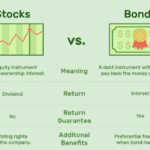Mutual Funds vs. ETFs: Which One Is Right for You?
When it comes to investing, mutual funds and exchange-traded funds (ETFs) are two of the most popular options. Both offer diversification, professional management, and accessibility for individual investors. However, they have key differences that may make one more suitable for your financial goals than the other. In this blog post, we’ll compare mutual funds and ETFs to help you determine which is the better choice for you.
What Are Mutual Funds?
A mutual fund is an investment vehicle that pools money from multiple investors to buy a diversified portfolio of stocks, bonds, or other assets. These funds are managed by professional portfolio managers and are typically bought and sold through investment companies or brokerage firms.
Key Features of Mutual Funds:
✔ Actively or passively managed – Some mutual funds aim to outperform the market (active management), while others simply track an index (passive management).
✔ Traded at Net Asset Value (NAV) – Mutual funds are only priced once a day after the market closes.
✔ Minimum investment requirements – Many mutual funds require a minimum investment (e.g., $500 or $1,000).
✔ Can have sales charges or fees – Some mutual funds charge front-end or back-end load fees, along with annual management fees (expense ratios).
What Are ETFs?
An exchange-traded fund (ETF) is also a pooled investment vehicle, but it trades like a stock on an exchange. ETFs can track an index (like the S&P 500), a specific sector, commodities, or even an investment strategy.
Key Features of ETFs:
✔ Mostly passively managed – Most ETFs track an index, but some actively managed ETFs exist.
✔ Traded throughout the day – Unlike mutual funds, ETFs can be bought and sold during market hours.
✔ Lower minimum investment – You can buy as little as one share of an ETF, making it accessible to smaller investors.
✔ Lower expense ratios – ETFs generally have lower costs than mutual funds.
Mutual Funds vs. ETFs: Key Differences
| Feature | Mutual Funds | ETFs |
|---|---|---|
| Trading | Priced once a day at NAV | Trades like a stock throughout the day |
| Management Style | Often actively managed | Typically passive, tracking an index |
| Fees & Expenses | Can have higher fees (expense ratios, loads) | Usually lower fees, no sales charges |
| Minimum Investment | Often requires a set amount (e.g., $1,000) | Can buy a single share |
| Tax Efficiency | Less tax-efficient due to frequent trades inside the fund | More tax-efficient, fewer capital gains distributions |
| Liquidity | Can only be bought or sold at NAV once per day | Highly liquid, traded in real-time |
Which One Is Right for You?
Choose Mutual Funds If:
✅ You prefer active management and professional fund managers making decisions on your behalf.
✅ You are investing for the long term and don’t need to trade frequently.
✅ You want an option for automatic investments and dollar-cost averaging without worrying about real-time pricing.
✅ You don’t mind slightly higher fees for potential outperformance of the market.
Choose ETFs If:
✅ You prefer lower fees and passive investing strategies.
✅ You want the ability to trade throughout the day at real-time prices.
✅ You are looking for tax efficiency, especially in a taxable brokerage account.
✅ You want more flexibility, including the ability to short-sell or use margin.
Final Thoughts
Both mutual funds and ETFs can be excellent investment choices, depending on your goals and preferences. If you value active management and don’t need to trade frequently, mutual funds may be a good fit. If you prefer lower costs, tax efficiency, and flexibility, ETFs might be the better option.
Before choosing, consider your investment style, risk tolerance, and how much you’re willing to pay in fees. Regardless of your choice, both mutual funds and ETF can help you build a well-diversified investment portfolio.




